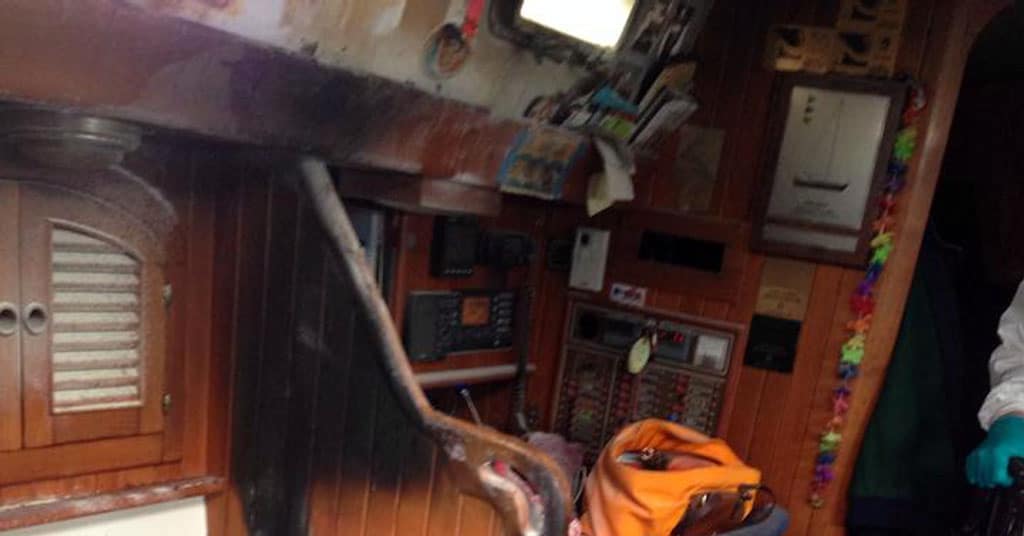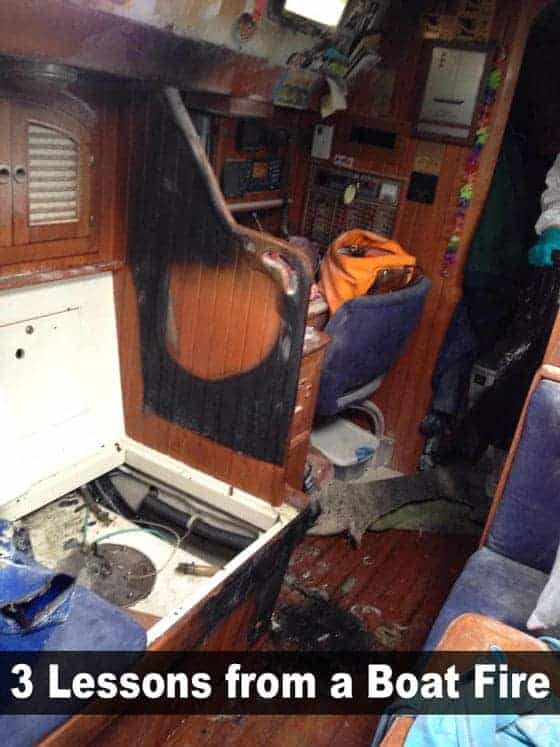The way boat fire lessons are the ones you gain from someone else’s experience. Back In 2014, Heidi Husler Hackler posted the photo above on the Women Who Sail Facebook page, with the following note. She graciously allowed me to use her photo and story to “spread the message.”
One Cruiser’s Story
In Heidi’s words:
Early yesterday morning we had a fire aboard our Passport 40 at the dock (electric radiator heater caused.) Luckily the smell of smoke from burning carpet and upholstery woke us up (please install a smoke detector if you don’t have one, we are very lucky to be alive!) And luckily Kirk was able to put the fire out w/ two fire extinguishers before the Seattle Fire Dept showed up 9 minutes after I called 911. Luckily we are insured and everything is repairable…
What a nightmare to wake up to! So glad it wasn’t worse.
To keep things simple, you need to do three things to keep a fire from causing a major tragedy on your boat.
Prevention First
Heidi’s fire was caused by their space heater. Nearly any heater can be dangerous on a boat. But if you’re living aboard in a cold climate you may feel that you have to do something. Think carefully about leaving one on overnight. And if you do, think about where it’s located and whether it could catch nearby items on fire. Additionally, if you are using an electric heater or electric blanket, make sure that the wiring is up to the task. Heaters pull a lot of amps!
Probably a better solution for cold weather cruising is to only use the space heater while you’re awake. If you bring a hot water bottle (Amazon) to bed with you and the next day’s clothes, you may not need heat overnight. In a marina, you might find an electric space heater with a remote control (Amazon) a good solution. Turn it on while you’re still cozy under the covers.
And, of course, a space heater is only one cause for boat fires. Make sure you maintain your wiring and propane system carefully. Shore power connections are also a frequent cause for marina fires. Many cruisers upgrade to a Smart Plug (Amazon) which avoids the twisting of wires endemic to traditional shore power systems.
Fire Warning Systems
Just like houses and apartments, boats need to have smoke detectors (Amazon). How many you need and where you place them will depend on the size and configuration of the boat. But it’s a good idea to have one in the engine compartment(s) as well as in living areas. Catamarans and tris need them in each hull. Be sure you regularly change batteries; twice a year should suffice. And remember, even hard wired battery detectors have batteries for backup.
In addition, a carbon monoxide detector (Amazon) is also a good thing to have (some smoke detectors also have a CO detector, such as this one on Amazon). You can get them at home improvement stores, big box stores and hardware stores.
Putting Out the Fire
When a fire starts, you have seconds to get it under control. Have plenty of fire extinguishers and know how to use them. At least one fire extinguisher should be located where you sleep. “Standard size” fire extinguishers only have about 20 seconds of “spray time” in them, so you may well need more than one to even get out safely, let alone actually put the fire out. Read more about using a fire extinguisher.
A fire blanket (Amazon) is also crucial for putting a fire out quickly. And it does so without the mess of an extinguisher. I’ve written about fire blankets here.
Final Tips
Heidi’s experience also makes me think of two other things. First, if you are in a marina and have even what seems to be a minor fire, call 911 (or the local equivalent). And if possible, make an announcement on the VHF to both warn nearby boats and to get them to bring extra fire extinguishers.
Perhaps an even better option is to make 5 short blasts on your sound signal device. Many boaters don’t monitor their VHF in marinas. And the sound signal will get attention.
Fires can get out of control quickly and your fire extinguishers may not totally put it out. Get help on their way to you ASAP! If you’re lucky, you can just greet them and tell them it’s out; if not, they’ll be there all that much faster, lessening the risk of the fire spreading.
Also, take the time to think about what you should do in a fire (read more) and have fire drills (read more). They’re every bit as important as MOB drills!
I hope these tips and some extra mindfulness will help you avoid a fire aboard your boat. But if the worst happens, being prepared can keep a fire small and merely inconvenient.

Carolyn Shearlock has lived aboard full-time for 17 years, splitting her time between a Tayana 37 monohull and a Gemini 105 catamaran. She’s cruised over 14,000 miles, from Pacific Mexico and Central America to Florida and the Bahamas, gaining firsthand experience with the joys and challenges of life on the water.
Through The Boat Galley, Carolyn has helped thousands of people explore, prepare for, and enjoy life afloat. She shares her expertise as an instructor at Cruisers University, in leading boating publications, and through her bestselling book, The Boat Galley Cookbook. She is passionate about helping others embark on their liveaboard journey—making life on the water simpler, safer, and more enjoyable.


The Boat Galley says
Thanks for sharing that tip!
Nelms Graham says
Please get rid of those old 1930’s construction technology plugs, adapted for marine shore plugs, ie. and replace with a “Smart Plug”. The Smart Plug has more surface area for less resistance and thus less heat and no twist lock, inducing looseness, which is the main contributor to overheating and fires. You can either purchase new cords or simply replace the ends with a kit.
Carolyn Shearlock says
Yes, while shore power connections were not the cause of the fire in this story, they are a major concern and the Smart Plug helps considerably.
Carolyn Shearlock says
Yep, I’ve written about fire blankets and how to use them: https://theboatgalley.com/fire-blanket/
Carolyn Shearlock says
I say battery because most hard-wired smoke detectors (actually ALL I’ve ever seen) are made for AC. That means that you have to have an inverter on and that will waste power. On top of that, they won’t have power if you turn the inverter off, or it has a problem . . . or if you leave the boat and, like us, turn off everything except the bilge pumps. I’d much rather just have a 9-volt battery and KNOW it always had power!
Matt Beaudoin says
Domestic hard wired smoke detectors still use batteries as a backup. I agree with the extra drain on marine AC and the possible need to add or scale an inverter for them, but don’t be concerned that they won’t work with a loss of power (though you gain nearly nothing from the AC wiring in a boat). In a house it is to help with owners with an out of sight, out of mind tendency.
Carolyn Shearlock says
Thanks Matt! Ones that were previously installed in a condo I had 20+ years ago didn’t have the battery backup — which was why I ended up with several “extra” smoke detectors since I still wanted to be protected if power went out — and I didn’t realize they had changed.
Sheryl Rieck says
You can’t just sink it and put it out? ?
Charlotte Caldwell says
We have a fire blanket in the galley